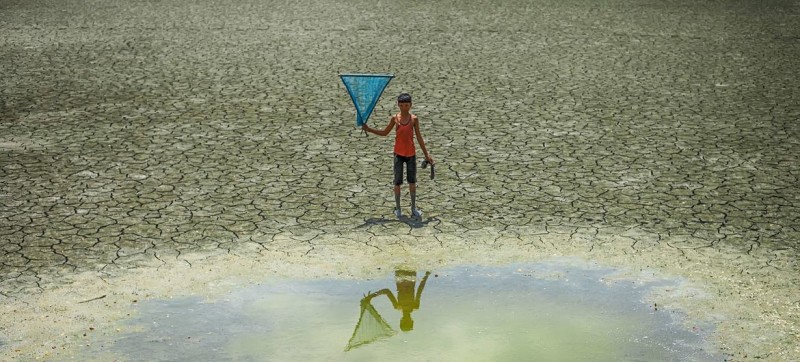Contents
A young boy stands in front of a waterhole in a drought zone in Bangladesh. The UN set an ambitious five year deadline on Wednesday for countries to ensure that citizens worldwide are protected by early warning systems against extreme weather and climate change, the UN chief announced, marking World Meteorological Day. “Early warnings and action save lives,” Secretary-General António Guterres said in a video message during a ceremony marking the day, adding that the World Meteorological Organization (WMO) would “spearhead new action to ensure every person on Earth is protected by early warning systems within five years.”
The agency will lead the effort and present an action plan in November at this year’s UN climate conference (COP 27) in Egypt.
Crucial investment
Spotlighting early warning and early action, he underscored: “We must invest equally in adaptation and resilience.”
“That includes the information that allows us to anticipate storms, heatwaves, floods and droughts.”
‘Unacceptable’ inequity
The most recent report of the Intergovernmental Panel on Climate Change (IPCC) details the ongoing suffering, as “each increment of global heating” further increases the “frequency and intensity of extreme weather events,” warned Mr Guterres.
He said it was unacceptable that one-third of the world’s people – living mainly in least developed countries (LDCs) and small island developing States (SIDS) – are still not covered by early warning systems.
“In Africa, it is even worse: 60 per cent of people lack coverage.”
Better forecasting
Climate change has become a more stark reality in all parts of the world, leading to increasingly extreme weather, including intense heatwaves, droughts and forest fires.
Meanwhile, increasing moisture in the atmosphere is leading to extreme rainfall and deadly flooding, while ocean warming is fuelling more powerful tropical storms and rising sea levels.
“We must boost the power of prediction for everyone and build their capacity to act,” said the Secretary-General.
“On this World Meteorological Day, let us recognize the value of early warnings and early action as critical tools to reduce disaster risk and support climate adaptation.”

A view of Seoul in South Korea.
Investing to improve
Over the past 50 years, a climate or water-related disaster has occurred on average each day – taking the lives 115 people and causing daily losses of $202 million, according to a 2021 WMO disaster statistics report.
Although the number of recorded disasters has increased by fivefold over that period, improved early warnings and disaster management have saved the lives of many.
“The growing number of disasters due to climate change is endangering implementation of a large number of Sustainable Development Goals (SDGs),” said WMO chief Petteri Taalas.
Noting that increasing investment in climate early warning services and related infrastructure is growing every-more important to climate adaptation, he described it as “one of the highest returns” going, for a modest stake.
“There is a need to invest $1.5 billion during the coming five years to improve the quality of the services and related infrastructures especially in the LDC and SIDS countries,” he flagged.
Warning systems
An integrated Early Warning System for floods, droughts, heatwaves or storms, alerts people to upcoming hazardous weather and informs governments, communities and individuals, so their impact can be minimized.
Using advanced computer models, they provide real-time monitoring on land and sea.
In addition to understanding forthcoming storm risks, a comprehensive early warning system must also include lessons learned from past events, to improve future response.

Supercell thunderstorm in Colorado, United States.
‘Adapt now’
Despite the many benefits outlined in the 2019 UN-backed Global Commission on Adaptation report Adapt Now, including a tenfold return on investment, one in three people globally is still not covered.
The Glasgow Climate Pact, agreed during COP26 last November, emphasized the urgency of scaling up action for enhanced adaptive capacity, strengthened resilience and reduced vulnerability to climate change.
It also urged developed countries to significantly scale up their provision of climate finance, technology transfer and capacity-building for adaptation.
WMO action plan
In achieving universal coverage of early warning services, WMO will seek to close observation gaps, expand country capacities for issuing warnings while simultaneously improving their ability to respond in a people-centred, inclusive and accessible manner.
The new plan seeks to build on existing WMO activities and partnerships, including with key agencies, countries and groups already active in the field.
This will require inputs from actors throughout the entire early action value chain to close early warning gaps.



